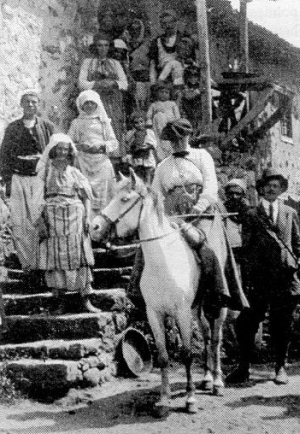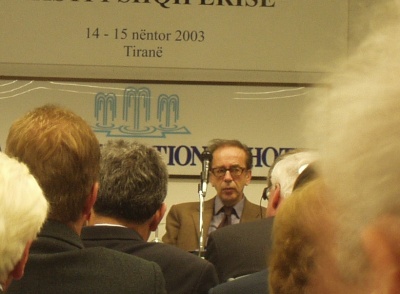Kanún today?
Kanún has not exactly been swept away because of social development; only at the time of the Hoxha-regime the authorities succeeded in suppressing customary law. It was written in the
»Tirana Times« 4th June 2005 that as much as 734 families in Northern Albania actually are involved in blood feuds. Hopefully traditional blood feuds will disappear by mediation and reconciliation - or by
»desvetudo«, that is when a blood feud not any longer is a proper way to solve a severe conflict among ordinary people.
From time to time Albanian media tell about
modern feuds – feuds in the dark, feuds between criminals. To Diana Gellçi these modern feuds have not very much in common with the traditional feuds. I agree in that, that is to some extent. On the other hand, if you are studying the dark areas of society – maybe in the context of acting against organized crime and trafficking - it will be helpful to know something about traditional life, not only in Albania but in other past societies too.
Customary law and government
Customary law – or local, independent and traditional rule - has often persisted when the Government was weak, distant or ignorant, it has been said. For long periods that might have been the situation in the Albanian highlands and in Kosova, for example in periods when the Sultan did not want to or was not able to control the Albanians in detail but only in some areas, cities and mostly in plain field.
Anyway, the situation when no state and no government has been established - and the situation when a weak state or King is in »power« are quite different.
The Danish history
In medieval Denmark the King aimed at controlling the society and protecting it, that was his
raison d'être. He could not do that alone, he had to come to agreement with the nobles, and in that course he and the nobles collected and re-constructed old customary law and published new common law. The articles about beehives, fish traps and water mills were only modified slightly since all agreed in them and in the necessity of such articles, the articles about revenge and ordeal by fire were radically modified because of clerical influence.
In the next hundreds of years economy and society developed, struggles for power went on from time to time – and first after some 4-500 years and a major defeat in the wars against the Swedish King, the Danish King was able to establish himself as an absolute monarch (in cooperation with some nobles and members of the upcoming classes of merchants etc.). Then in 1683 he issued a new common law of his own. Some elements of the customary law were integrated in this new law, some of them abolished – and there was not any longer doubt about the King's overall monopoly in criminal law. So, in Danish history customary law has either been integrated in the law process and been modified - or has been abolished. And some parts have »expired« by
desvetudo.
After a great political crisis in the mid of the 19th century, the Danes began to establish a democratic society and new customary law - and that law is in many aspects distinct from the medieval law and the law of 1683.
Most Danes accept parliamentary law, they even want it enforced, the dark forces punished and taken into custody - and the dark spots »enlightened«. But in some limited and sinister »parts« of Danish society, the areas of biker gangs and of drug traffickers, modern »clan law« actually is in force.
The Albanian history
In Albania history has been quite different from Danish history. Possibly some elements of customary law have been integrated in – and modified by – modern law; many other elements may officially have been abandoned, but have persisted in some periods - and in the most »remote« parts of the country.
But since government in many aspects has been weak after the break-down of the Hoxha-regime - and since economic conditions are so poor, a new, big and dark society has been developed beside the »official« one. In this new parallel society – which is estimated to cover about 60% of the Albanian economy – a new customary law is being established. Some of the »articles« are, I imagine, rules of old age built upon the principle of reciprocity and upon an ancient code of honour. But more of the »articles« are new, built upon principles of hierarchy and power.
Here is much to study - and much to worry about.
Bjoern Andersen
Literature etc.:
 Edith Durham in Northern Albania 1913
Edith Durham in Northern Albania 1913
Books:
Diana Gellçi: »Gjakmarrja: Albanian Highlander's »Blood Feud« as Social Obligation«, Albanian Institute for International Studies, Tirana, 2005.
»The Code of Lekë Dukagjini, Albanian Text Collected and Arranged by Shtjefën Gjeçov, translated by Leonard Fox«, Gjonlekaj Publishing Company, New York, 1989.
Edith Durham: »High Albania«, 1st edition 1909, available on the internet: http://digital.library.upenn.edu/women/durham/albania/albania.html
Margaret Hasluck: »The Unwritten Law in Albania«, Cambridge University Press, 1954.
Ismail Kadaré: »Broken April«. 1st edition 1982. Danish edition, Copenhagen 2000.
Film:
Saimir Kumbaro: »The End of the Vendetta«.
Fulvio Mariani and Elvira Dones: »Inchiodato« [Albanian: »I ngujuar«], cf.: http://www.fipa.tm.fr/programmes/2005/fr.php?f=rep_11563&r=prsc
Newsarticle:
»Thousands disenfranchised because of blood feuds« - article in »Tirana Times« 4th June 2005
Mediation and reconciliation:
http://www.afcr-al.org/english/profile/r-introduction.shtm (cf.:
http://bjoerna.dk/dokumentation/mediation.htm)
Bjoern Andersen holds a MA in Sociology and Danish philology. He has visited Albania some times through the years, the first time in 1976. In 2003 and 2004 he was a participant in the conferences about 'the clash of civilizations' and 'religious tolerance', both in Tirana.
He is the author of books in Danish about Albanian history, eg a collection of articles in »Albanske Studier« 1-2 (Soeborg, Cph. 2002), cf.: http://bjoerna.dk/albansk-historie/studier-2002.htm. Among the articles some about Edward Lear, Edith Durham, Sami Frashëri and Ismail Kadaré. Also an article about feuds in Corsica.
BA has published the play of Sami Bey Frashëri: »Besa« on the internet in a Danish translation of Johannes Oestrup [Johannes Østrup]: »Æresordet«, Cph. 1912.: http://scanderbeg.dk/frasheri/aeresordet.htm.
Recently he has published the 'Danish Law of 1683' in a digital edition - and by now he is working on a book about the Danish-Norwegian author Ludvig Holberg - who, in 1739, issued an appreciating article about Scanderbeg. Cf.: »A viewpoint from Copenhagen« http://bjoerna.dk/Holberg/Scanderbeg.htm.
You may quote this newsletter by referring to: http://bjoerna.net/sidste-nyt/277.htm or http://bjoerna.net/sidste-nyt/277.pdf



